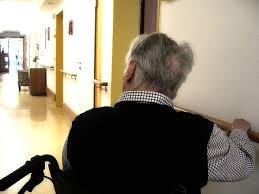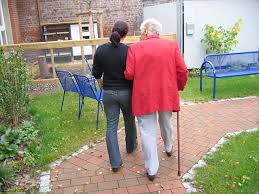Alzheimer’s and Isolation – Providing a Lifeline to the World
 Alzheimer’s disease, which is the most common form of dementia, requires a specific and dedicated kind of care. Caregivers must work closely with their patients, whose worlds seem to shrink as their cognitive function, memory and mental sharpness deteriorate. This creates feelings of isolation, which can lead to depression, so it’s critical for caregivers and family members to offer support and love in ways that preserve patients’ feelings of connectedness with others.
Alzheimer’s disease, which is the most common form of dementia, requires a specific and dedicated kind of care. Caregivers must work closely with their patients, whose worlds seem to shrink as their cognitive function, memory and mental sharpness deteriorate. This creates feelings of isolation, which can lead to depression, so it’s critical for caregivers and family members to offer support and love in ways that preserve patients’ feelings of connectedness with others.
Isolation is common among Alzheimer’s patients and their caregivers, especially when patients begin to believe that they are a burden to others. Fortunately, solutions are available. The following pieces of advice won’t slow the disease, but they will help Alzheimer’s sufferers and those providing in home care get the most out of life each and every day!
Lean on Support Groups
One of the best ways to avoid feelings of isolation is to connect with people who share the Alzheimer’s experience. The ability to relate to others and connect with those who feel the same pain can ensure that life remains rich and fulfilling, even as the disease takes its toll. Support groups – particularly in the early stages of Alzheimer’s disease – can provide tremendous relief for patients and their caregivers.
Contribute to Family Life
Family members and caregivers should make a special point to ensure that Alzheimer’s patients continue to contribute to family life during each stage of the disease. This benefits patients greatly, particularly when those contributions are acknowledged strongly and regularly by those involved.
Schedule Meaningful Activities
It is common for Alzheimer’s patients and their caregivers to remove activities from daily life as the disease progresses; sometimes it just seems too difficult to adhere to a social or recreational schedule. But maintaining a schedule with these types of activities is crucial when it comes to staving off depression and isolation.
Provide Affirmation and Reassurance
 Perhaps the best thing that caregivers and family members can do is to provide reassurance and affirmation that the patient is a loved, respected and appreciated member of the family whose life continues to have great meaning. Many Alzheimer’s patients feel as if they’re burdening their caregivers as they notice themselves deteriorate. The people providing care can make a huge difference by offering unconditional support and love, which can melt away those feelings of guilt.
Perhaps the best thing that caregivers and family members can do is to provide reassurance and affirmation that the patient is a loved, respected and appreciated member of the family whose life continues to have great meaning. Many Alzheimer’s patients feel as if they’re burdening their caregivers as they notice themselves deteriorate. The people providing care can make a huge difference by offering unconditional support and love, which can melt away those feelings of guilt.
Help Is Here
Always Best Care is on the leading edge of in-home care for Alzheimer’s patients. If you’re wondering how to ensure that your loved one retains a rich and fulfilling life in the midst of dementia, please don’t hesitate to contact us for a free consultation. We’re here to help, and we’d love to hear from you!










